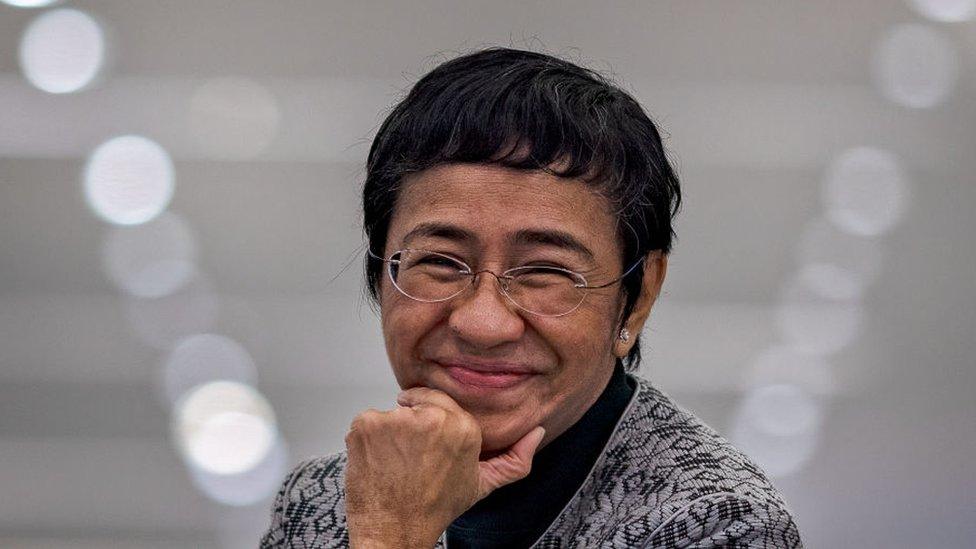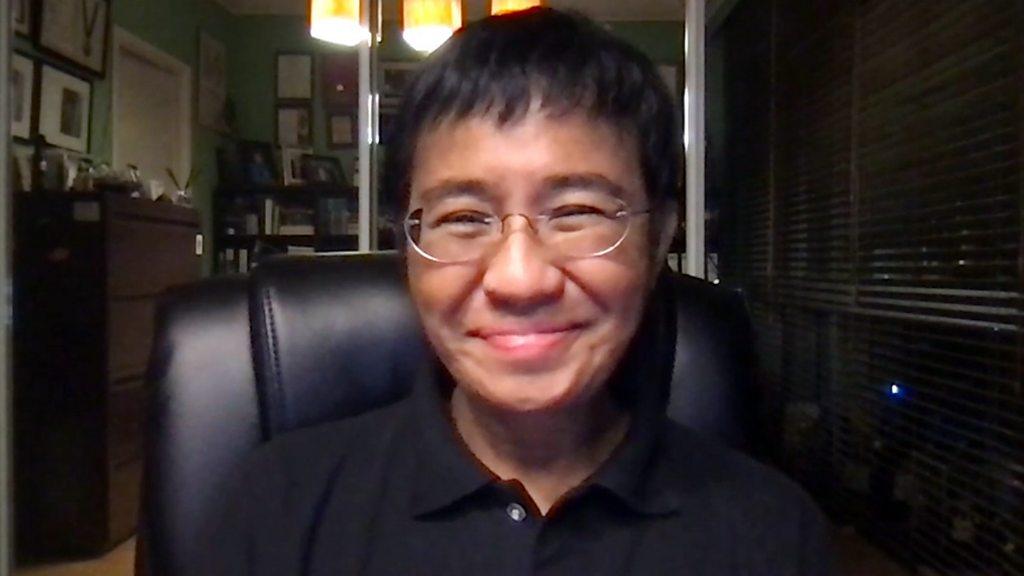Maria Ressa: Truth and justice won today, says Nobel laureate
- Published

Maria Ressa won a Nobel Peace Prize in 2021
Maria Ressa looks and sounds like she is on top of the world, and understandably so - this has been a huge victory for her.
A court in the Philippines has acquitted the journalist and her news outlet Rappler of tax evasion, in a move hailed as a win for press freedom.
In an interview for the BBC, she talks about what she calls the "weaponisation of the law" against her - and how it took more than four years to get to this point.
"This is a day that we had hoped would happen sooner," she told me over zoom from Manila - beaming smiles as she spoke.
"And you know, it went down to these three things, facts, truth and justice. That is who won today."
Under former president Rodrigo Duterte, the Philippine government had accused Ms Ressa and Rappler of evading tax payments when it raised capital through its partnership with foreign investors. Ms Ressa and Rappler denied the charges.
Rappler had been one of the few Philippine media organisations to be openly critical of Mr Duterte and his policies.
The Philippines' National Union of Journalists said the tax evasion case reflected an increasing use of law for reprisal and intimidation against journalists and civil society.
But it hasn't been an easy road, and there's still a tough battle ahead. Ms Ressa is acutely aware of the trials she has yet to face, but draws her inspiration from those who have gone before her.
"You know, Martin Luther King says, yes - it will take time," she said. "But as I was reading through the decision, and there was no reason to take us to court... we're not tax evaders - we never were… This was an incredibly important day because it would have set a direction for which way the Philippines was going."
Maria Ressa's legal problems started while Mr Duterte's administration was in power, and continued into the current President Ferdinand Marcos Junior's time.
Does she think things are changing now, under his rule?
"Our president is in Davos today speaking to business leaders," she muses. "So it is, it's a great signal to bring about where the Philippines is. We still have a ways to go - the fight isn't over. And can I go to jail? I hope not. I'll knock on wood, you know, but I was ready for either decision."
It's clear that Maria Ressa is up for the fight - she still has several cases against her, and faces significant prison sentences for them - those legal challenges are looming.
The last four years have taken their toll on her family, especially her parents. But as she puts it, it's par for the course in this job.
"It's like being in a conflict area - being in a war zone. It's just long, right?"
Ms Ressa's enthusiasm and optimism are infectious - but behind the beaming smiles and much deserved relief is a palpable sense of injustice.
This is not just directed at the system that could have potentially put her behind bars, but at social media firms that she feels are partially to blame for the scourge of fake news in the Philippines - something she says is responsible for so many of the country's problems today.
"The world as we knew it has been completely destroyed," she tells me. "Are you on TikTok? Because I talk about Facebook as a mallet for our minds, but TikTok as a surgical probe.
"Imagine if you're in high school and you're trying to curate your life for a feed… that could turn into a mob… What types of values do you have? I worry about the next generation."
So what would she say to Facebook CEO Mark Zuckerberg if she could sit down with him face to face?
Ms Ressa doesn't miss a beat.
"Draw your lines, Mark," she exclaims. "In America… you prioritise your shareholders. But there is a line between amoral, immoral and evil. And you have to know when when you cross those lines, when what you have created inspires autocracy, and fascism inspires violence, enables genocide."
Related topics
- Published3 May 2021
